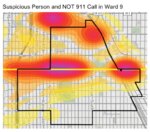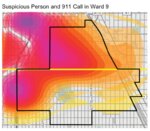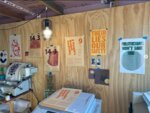By Andrea Tritschler, communications, andrea@longfellow.org
Confluence Studio is an open, critical space for neighbors to imagine different ways for our communities to live. Through creative collaboration, art, and creativity, Confluence plays through future scenarios of what life could be like – practically merged with utopia.
We are all dreamers in our own way, lost in our thoughts of what could be sometimes as a way to escape what is. The work of Confluence Studio both acknowledges the reality and our desires to shape the future through assemblies, galleries, and data. As its name suggests, it brings together ideas and tools as a way of moving forward.
Behind the work of Confluence Studio are Sam Gould and Duaba Unenra. The two have been collaborating for years, and around February of 2020, there was an invitation for participatory development work.
“We are interested in ideas around urban space and how sociality and grassroots history play into how urban space is formed and how those spaces are informed by those histories,” Gould said.
A little more than a month later and COVID-19 happened; then the uprising happened.
“Those events created a patina of what we came from; a societal eruption that stems from this space we share,” Gould said. “Prior to that so much of our work was aligned with place and a reconfiguring of what we’ve been doing for close to a decade… Using all tools within the larger picture, but those events couldn’t help but reconfigure things in some way.”
The Data/Justice Lab
In 2023, Longfellow Community Council created our communities grants program, to fund neighborhood projects, ideas, art, and more. Confluence Studio, which in-part operates out of an Autonomous Mobile Media Unit (AMMU) in the lot of Moon Palace Books, was one of the first organizations to receive grant funding from LCC, for their Data/ Justice Lab and Autonomous Request for Proposal (A-RFP).
The Data/ Justice Lab is a collaboration between Carleton College Art and Architecture Historian Ross Elfline, Statistician Claire Kelling and Confluence Studio. The program analyzes the ways in which power shows up in our relationship to public space and to each other.
“I thought this was a unique opportunity to do quantitative work that could then show up in a qualitative way,” Gould said.
Currently, the team is working on developing a platform for the Data/Justice Lab – how it operates and how neighbors will be involved. The team started with an inquiry about how neighbors view neighbors as suspicious and how police view suspicious neighbors. Using a tool called the Shiny App, a bot that scrubs massive amounts of data, the team refines that data through the experiential data of our community.
“What I would like in time, is that it’s not just looking at police data but power data – how are we policed outside of the notion of MPD?” Gould said. “There are many ways that all populations are policed, but a percentage of those are policed through institutional backends, by expanding the scope of social control beyond policing as we know it. I would like to see that refinement in the work that we do with the Data Justice Lab, but that takes time and authentic engagement with neighbors to refine based on lived experience. That refinement is the core of the work we hope to do in the long term with that platform.”
The Shiny App gathered data on the use of force by the Minneapolis Police Department in 2022 and 2023 and it was similar to the “suspicion person” heat map (which was created before the implementation of the Shiny App). In 2022, there were 273 officer-reported incidents of use of force by MPD, and they were heavily concentrated in Little Earth and the Midtown/ Phillips areas of Ward 9. In 2023, 215 officer-reported incidents of use of force almost entirely shifted down to Lake Street and Hiawatha under the light rail tracks. But data without context is just numbers.
Living in these neighborhoods, you have the experiential and community information. In 2022, Kia car thefts were at their highest. Many of those on the Southside responsible for, or in proximity to those involved in, the thefts were teenagers living around Midtown/Phillips and Little Earth. We know this information as residents, and Gould also has insight on this from his wife, who is a public defender, and had many of these kids as her clients. In 2023, those car thefts dropped steeply, but the antisocial social life had a huge increase.
“It shows us simply and clearly MPD’s policy and directives regarding how they deal with localized waves of antisocial behavior: aggression and force,” Gould said. “And you often only know that if you live here. And I think it’s really easy to avoid even if you live in the city and you don’t live in the neighborhoods where it’s happening. You might not ask why it shifts if you didn’t already know what was happening on the ground.”
The Shiny App provides Confluence and company information that they can transform into different projects and platforms so that people can understand this data in different ways, according to Gould. He recognized that sometimes there can be walls to understanding, and that by creating different entry points, they are creating a door rather than a wall. Through creating social tools, like the Shiny App, the AMMU (the container studio), and their monthly assemblies, Confluence Studio creates ways for people to come together and create on their own.
“When we started (the assemblies), we were hoping that the whole neighborhood would come, but of course that didn’t happen,” Gould said. “Size is not a guarantor of success in terms of visible numbers. It's through creating entanglements that we help one another create new meanings.”
Confluence Studio hosts monthly assemblies, typically on the second Saturday of the month. Neighborhood relationships have developed throughout the year of the assemblies, as have questions around our relationship to space, power, environment, and more.
“It’s a tool that relates to considering social formations, and what comes out if it is uniquely your own and starts getting into the firmament. That’s when things elementally began to change – maybe in five, 10, 20 years, but together we’re creating that space of critical collision and engagement,” Gould said. “And without that, we are only responding to crises all the time. We wanted to create a space that avoids the machinations of crisis culture, because it's so easy to manipulate that, to create. There will always be someone showing up to put out fires, but what we want to focus on is how we can manage the land better?”
Confluence Studio is hoping that fairly soon they can implement elements of the Shiny App into the assemblies and the A-RRP.
Autonomous Request for Proposal
Confluence Studio also received funding from LCC for their Autonomous Request for Proposal, which they have begun focusing on this year. They first needed to get information and form a collective of people before they could do this work.
“In a practical and utopian sense [the A-RFP] is a way to think about the use the literal space of the 3rd Precinct site and what it could be, but it is also a working metaphor about how we can transform space through the lens of safety, security, and support,” Gould said. “How through the transformation of our built structures we can think about the ways we pass by and entangle with one another.”
Gould thinks about it as a tool for critical dreaming. The A-RFP process will have an official launch next month with the goal of closing out the process at the end of the year. Those interested in getting involved with the process can join in through one of three tracks –broadly defined professionals - people who pay attention to design; neighbors; and youth.
Neighbors will be able to vote on the ideas and the outcomes that feel most applicable to the neighborhood, although as with everything Confluence Studio does, it will likely be an intermixing of a lot of different things. The A-RFP will be presented to the community through an exhibition and publication platform.
Gould is aware that the city has plans for what they want to do with that space, but he remains encouraged.
“If we do this work it will change how people show up for one another and themselves,” he said. “Optimistically I would like it to actually inform future structural transformations in the neighborhood, but practically it's the former [showing up], but I think that’s really useful and it has a lot of benefit. It allows us, as neighbors, to see the world around us differently”
While the future of the former 3rd Precinct site is of great concern, the goal isn’t necessarily to create immediate or near-future change in that physical space, but be practiced as a community in the mindset of collective criticism, organization, and arrival when the next thing happens – that as a neighborhood, we’ll be prepared with the tools we need to create the future we want to see for ourselves and our community.
If you want to learn more about Confluence Studio, check out their website: https://confluence-studio.org/. Or, attend their next assembly on May 11. Email andrea@longfellow.org with any questions about the Longfellow Community Council grant program.



Comments
No comments on this item Please log in to comment by clicking here